Communication Assignment Solved
VerifiedAdded on 2020/12/31
|9
|2091
|133
AI Summary
Contribute Materials
Your contribution can guide someone’s learning journey. Share your
documents today.
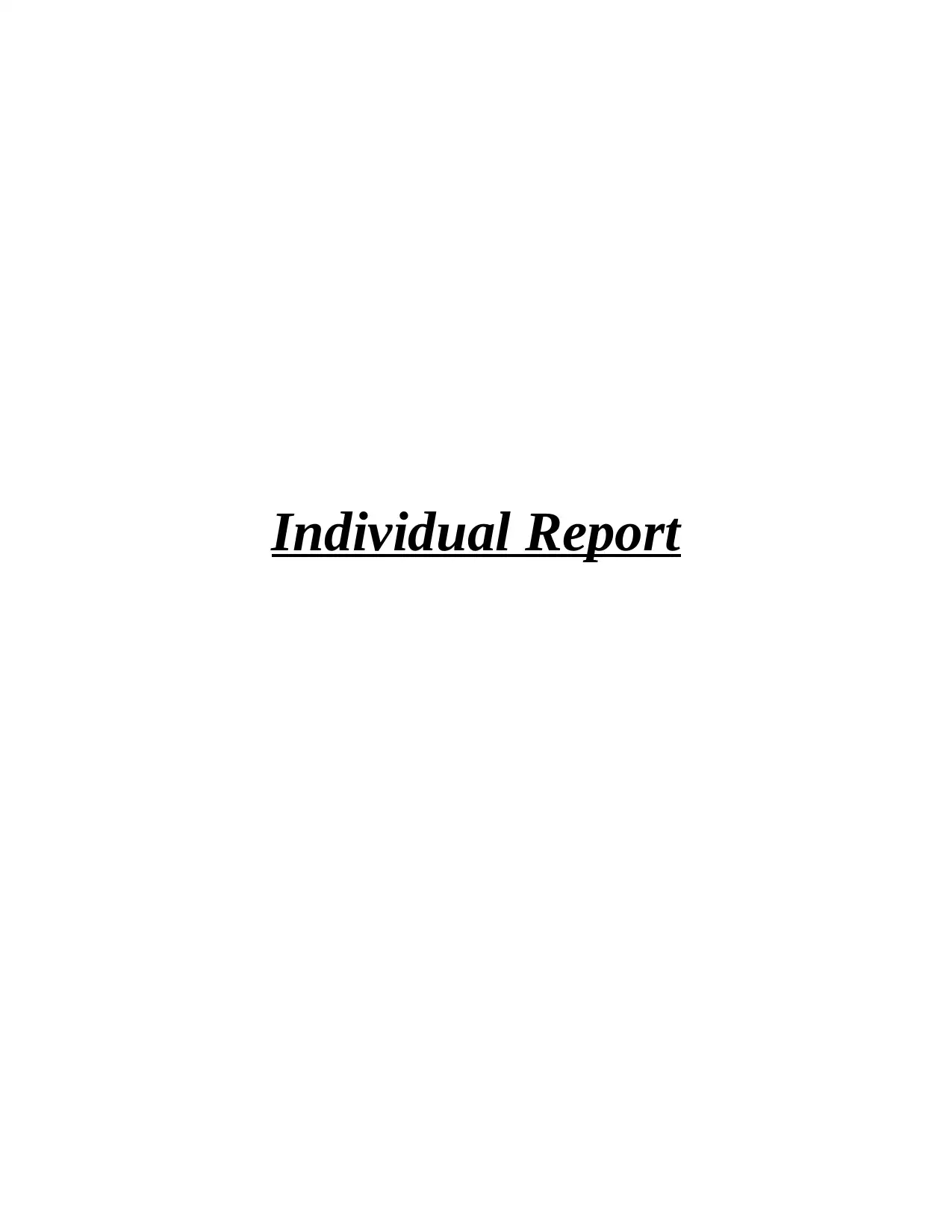
Individual Report
Secure Best Marks with AI Grader
Need help grading? Try our AI Grader for instant feedback on your assignments.
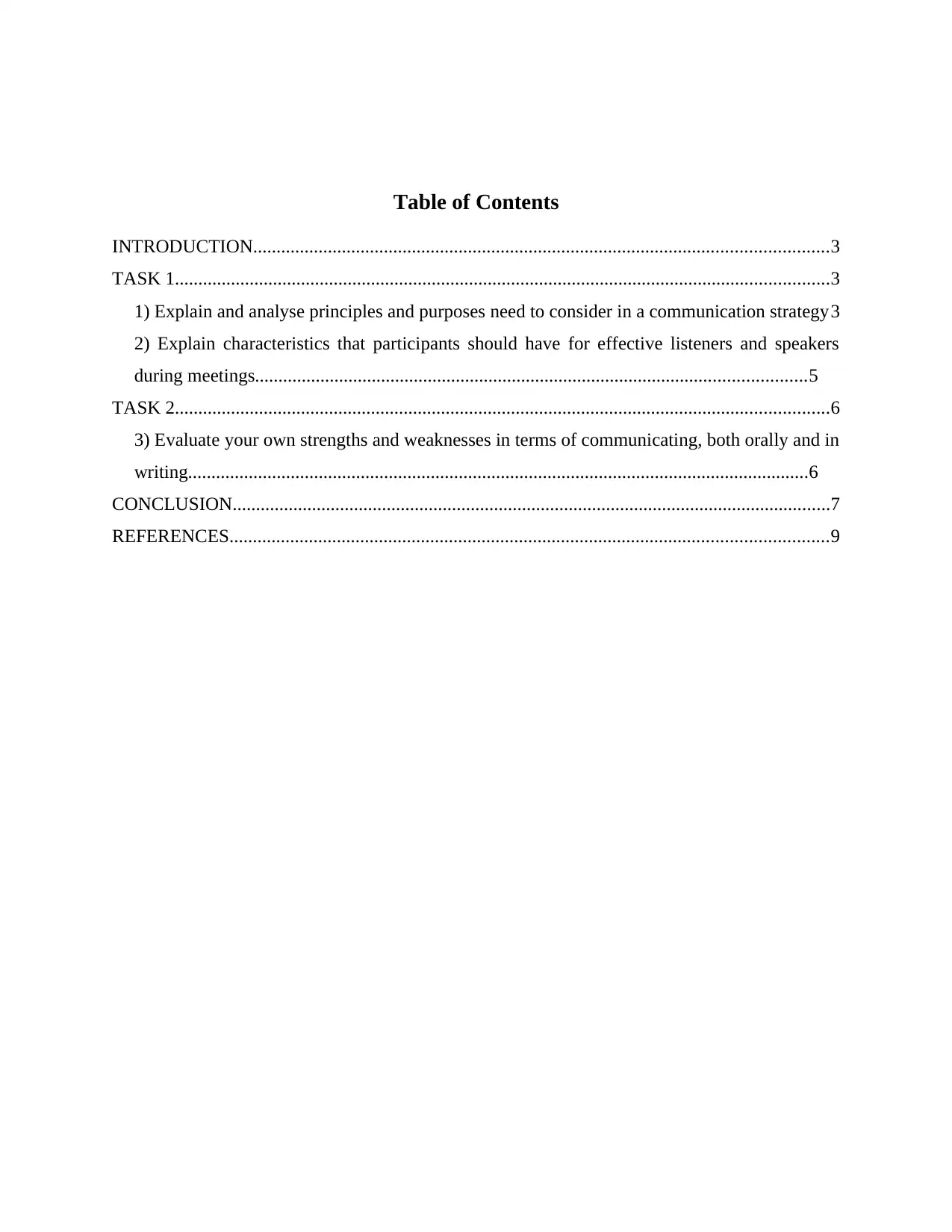
Table of Contents
INTRODUCTION...........................................................................................................................3
TASK 1............................................................................................................................................3
1) Explain and analyse principles and purposes need to consider in a communication strategy3
2) Explain characteristics that participants should have for effective listeners and speakers
during meetings......................................................................................................................5
TASK 2............................................................................................................................................6
3) Evaluate your own strengths and weaknesses in terms of communicating, both orally and in
writing.....................................................................................................................................6
CONCLUSION................................................................................................................................7
REFERENCES................................................................................................................................9
INTRODUCTION...........................................................................................................................3
TASK 1............................................................................................................................................3
1) Explain and analyse principles and purposes need to consider in a communication strategy3
2) Explain characteristics that participants should have for effective listeners and speakers
during meetings......................................................................................................................5
TASK 2............................................................................................................................................6
3) Evaluate your own strengths and weaknesses in terms of communicating, both orally and in
writing.....................................................................................................................................6
CONCLUSION................................................................................................................................7
REFERENCES................................................................................................................................9
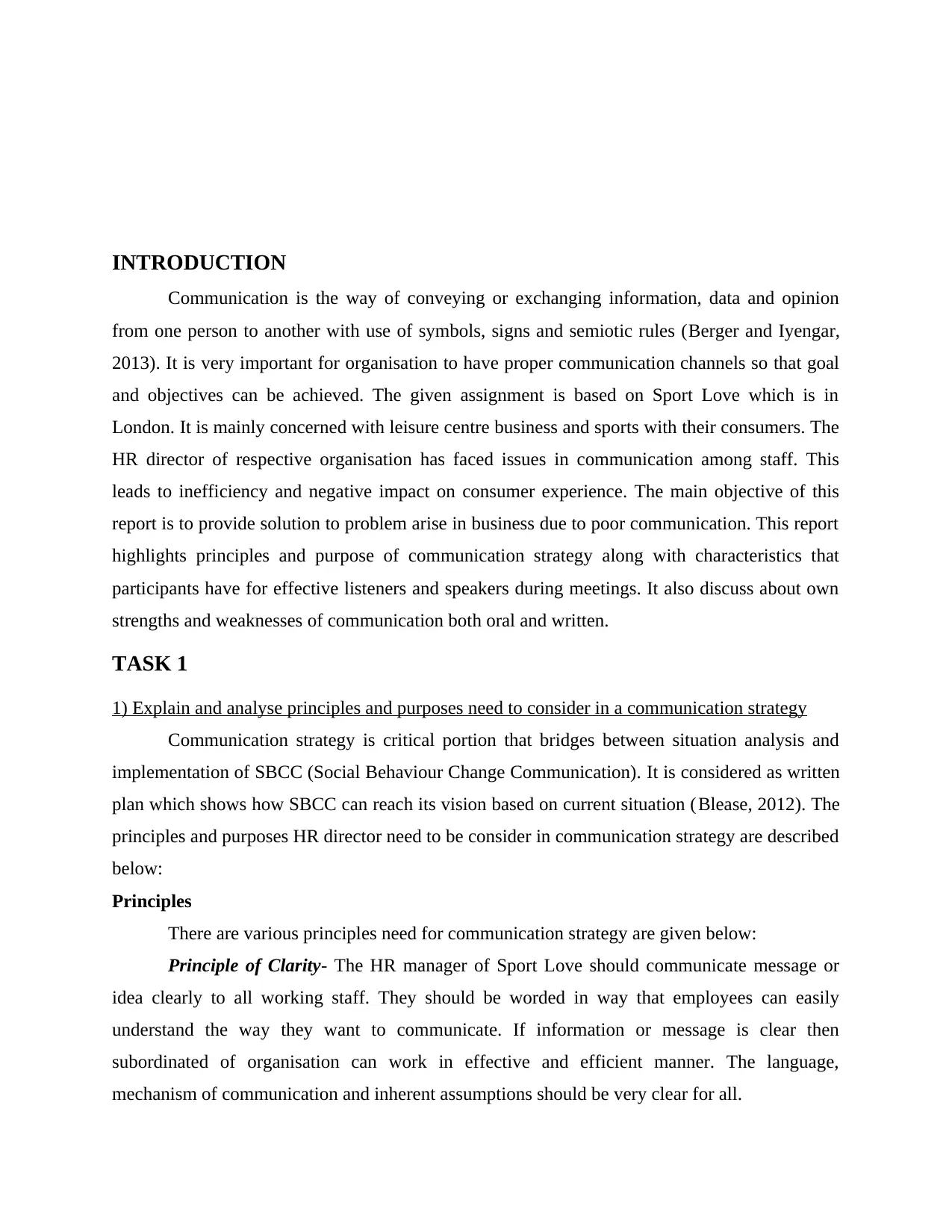
INTRODUCTION
Communication is the way of conveying or exchanging information, data and opinion
from one person to another with use of symbols, signs and semiotic rules (Berger and Iyengar,
2013). It is very important for organisation to have proper communication channels so that goal
and objectives can be achieved. The given assignment is based on Sport Love which is in
London. It is mainly concerned with leisure centre business and sports with their consumers. The
HR director of respective organisation has faced issues in communication among staff. This
leads to inefficiency and negative impact on consumer experience. The main objective of this
report is to provide solution to problem arise in business due to poor communication. This report
highlights principles and purpose of communication strategy along with characteristics that
participants have for effective listeners and speakers during meetings. It also discuss about own
strengths and weaknesses of communication both oral and written.
TASK 1
1) Explain and analyse principles and purposes need to consider in a communication strategy
Communication strategy is critical portion that bridges between situation analysis and
implementation of SBCC (Social Behaviour Change Communication). It is considered as written
plan which shows how SBCC can reach its vision based on current situation (Blease, 2012). The
principles and purposes HR director need to be consider in communication strategy are described
below:
Principles
There are various principles need for communication strategy are given below:
Principle of Clarity- The HR manager of Sport Love should communicate message or
idea clearly to all working staff. They should be worded in way that employees can easily
understand the way they want to communicate. If information or message is clear then
subordinated of organisation can work in effective and efficient manner. The language,
mechanism of communication and inherent assumptions should be very clear for all.
Communication is the way of conveying or exchanging information, data and opinion
from one person to another with use of symbols, signs and semiotic rules (Berger and Iyengar,
2013). It is very important for organisation to have proper communication channels so that goal
and objectives can be achieved. The given assignment is based on Sport Love which is in
London. It is mainly concerned with leisure centre business and sports with their consumers. The
HR director of respective organisation has faced issues in communication among staff. This
leads to inefficiency and negative impact on consumer experience. The main objective of this
report is to provide solution to problem arise in business due to poor communication. This report
highlights principles and purpose of communication strategy along with characteristics that
participants have for effective listeners and speakers during meetings. It also discuss about own
strengths and weaknesses of communication both oral and written.
TASK 1
1) Explain and analyse principles and purposes need to consider in a communication strategy
Communication strategy is critical portion that bridges between situation analysis and
implementation of SBCC (Social Behaviour Change Communication). It is considered as written
plan which shows how SBCC can reach its vision based on current situation (Blease, 2012). The
principles and purposes HR director need to be consider in communication strategy are described
below:
Principles
There are various principles need for communication strategy are given below:
Principle of Clarity- The HR manager of Sport Love should communicate message or
idea clearly to all working staff. They should be worded in way that employees can easily
understand the way they want to communicate. If information or message is clear then
subordinated of organisation can work in effective and efficient manner. The language,
mechanism of communication and inherent assumptions should be very clear for all.
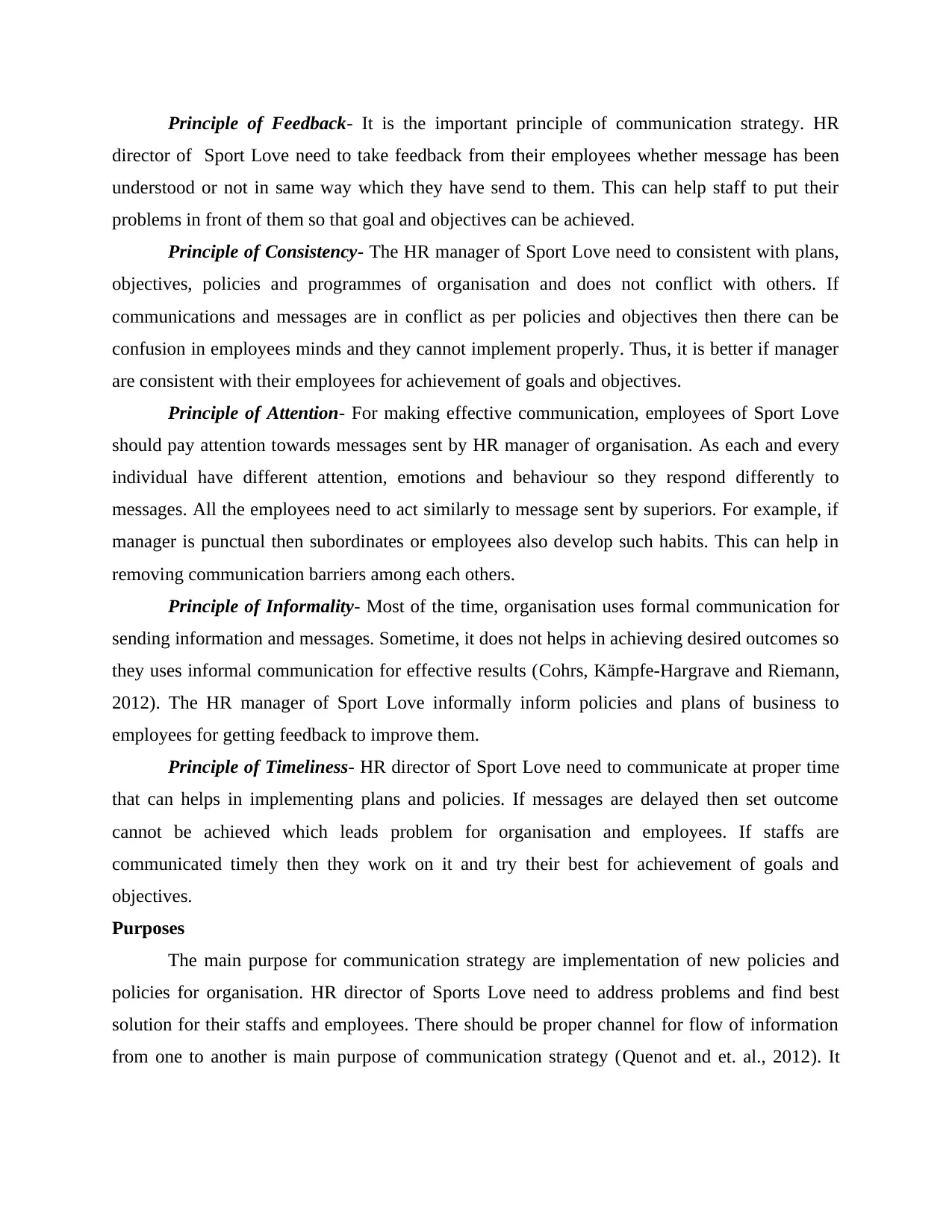
Principle of Feedback- It is the important principle of communication strategy. HR
director of Sport Love need to take feedback from their employees whether message has been
understood or not in same way which they have send to them. This can help staff to put their
problems in front of them so that goal and objectives can be achieved.
Principle of Consistency- The HR manager of Sport Love need to consistent with plans,
objectives, policies and programmes of organisation and does not conflict with others. If
communications and messages are in conflict as per policies and objectives then there can be
confusion in employees minds and they cannot implement properly. Thus, it is better if manager
are consistent with their employees for achievement of goals and objectives.
Principle of Attention- For making effective communication, employees of Sport Love
should pay attention towards messages sent by HR manager of organisation. As each and every
individual have different attention, emotions and behaviour so they respond differently to
messages. All the employees need to act similarly to message sent by superiors. For example, if
manager is punctual then subordinates or employees also develop such habits. This can help in
removing communication barriers among each others.
Principle of Informality- Most of the time, organisation uses formal communication for
sending information and messages. Sometime, it does not helps in achieving desired outcomes so
they uses informal communication for effective results (Cohrs, Kämpfe-Hargrave and Riemann,
2012). The HR manager of Sport Love informally inform policies and plans of business to
employees for getting feedback to improve them.
Principle of Timeliness- HR director of Sport Love need to communicate at proper time
that can helps in implementing plans and policies. If messages are delayed then set outcome
cannot be achieved which leads problem for organisation and employees. If staffs are
communicated timely then they work on it and try their best for achievement of goals and
objectives.
Purposes
The main purpose for communication strategy are implementation of new policies and
policies for organisation. HR director of Sports Love need to address problems and find best
solution for their staffs and employees. There should be proper channel for flow of information
from one to another is main purpose of communication strategy (Quenot and et. al., 2012). It
director of Sport Love need to take feedback from their employees whether message has been
understood or not in same way which they have send to them. This can help staff to put their
problems in front of them so that goal and objectives can be achieved.
Principle of Consistency- The HR manager of Sport Love need to consistent with plans,
objectives, policies and programmes of organisation and does not conflict with others. If
communications and messages are in conflict as per policies and objectives then there can be
confusion in employees minds and they cannot implement properly. Thus, it is better if manager
are consistent with their employees for achievement of goals and objectives.
Principle of Attention- For making effective communication, employees of Sport Love
should pay attention towards messages sent by HR manager of organisation. As each and every
individual have different attention, emotions and behaviour so they respond differently to
messages. All the employees need to act similarly to message sent by superiors. For example, if
manager is punctual then subordinates or employees also develop such habits. This can help in
removing communication barriers among each others.
Principle of Informality- Most of the time, organisation uses formal communication for
sending information and messages. Sometime, it does not helps in achieving desired outcomes so
they uses informal communication for effective results (Cohrs, Kämpfe-Hargrave and Riemann,
2012). The HR manager of Sport Love informally inform policies and plans of business to
employees for getting feedback to improve them.
Principle of Timeliness- HR director of Sport Love need to communicate at proper time
that can helps in implementing plans and policies. If messages are delayed then set outcome
cannot be achieved which leads problem for organisation and employees. If staffs are
communicated timely then they work on it and try their best for achievement of goals and
objectives.
Purposes
The main purpose for communication strategy are implementation of new policies and
policies for organisation. HR director of Sports Love need to address problems and find best
solution for their staffs and employees. There should be proper channel for flow of information
from one to another is main purpose of communication strategy (Quenot and et. al., 2012). It
Secure Best Marks with AI Grader
Need help grading? Try our AI Grader for instant feedback on your assignments.
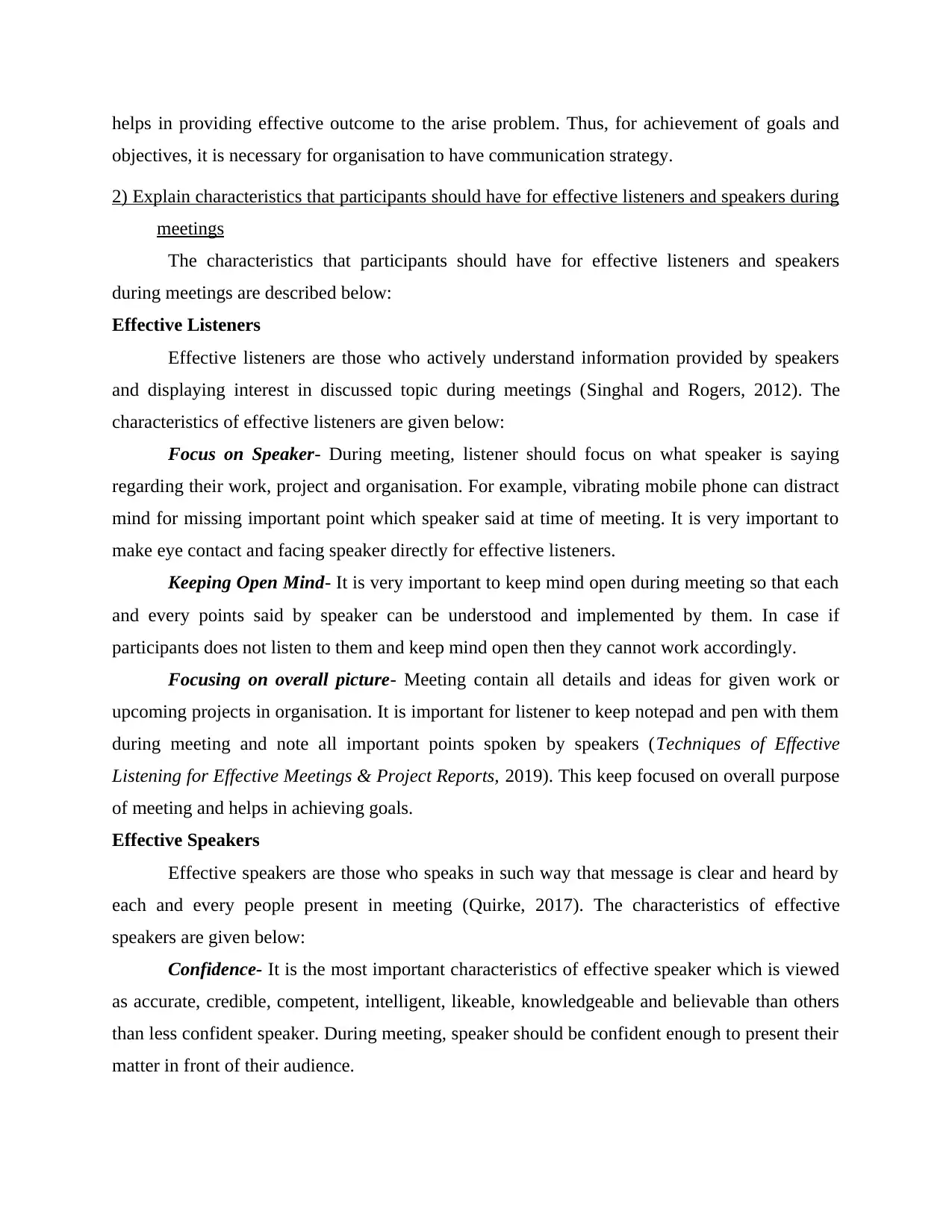
helps in providing effective outcome to the arise problem. Thus, for achievement of goals and
objectives, it is necessary for organisation to have communication strategy.
2) Explain characteristics that participants should have for effective listeners and speakers during
meetings
The characteristics that participants should have for effective listeners and speakers
during meetings are described below:
Effective Listeners
Effective listeners are those who actively understand information provided by speakers
and displaying interest in discussed topic during meetings (Singhal and Rogers, 2012). The
characteristics of effective listeners are given below:
Focus on Speaker- During meeting, listener should focus on what speaker is saying
regarding their work, project and organisation. For example, vibrating mobile phone can distract
mind for missing important point which speaker said at time of meeting. It is very important to
make eye contact and facing speaker directly for effective listeners.
Keeping Open Mind- It is very important to keep mind open during meeting so that each
and every points said by speaker can be understood and implemented by them. In case if
participants does not listen to them and keep mind open then they cannot work accordingly.
Focusing on overall picture- Meeting contain all details and ideas for given work or
upcoming projects in organisation. It is important for listener to keep notepad and pen with them
during meeting and note all important points spoken by speakers (Techniques of Effective
Listening for Effective Meetings & Project Reports, 2019). This keep focused on overall purpose
of meeting and helps in achieving goals.
Effective Speakers
Effective speakers are those who speaks in such way that message is clear and heard by
each and every people present in meeting (Quirke, 2017). The characteristics of effective
speakers are given below:
Confidence- It is the most important characteristics of effective speaker which is viewed
as accurate, credible, competent, intelligent, likeable, knowledgeable and believable than others
than less confident speaker. During meeting, speaker should be confident enough to present their
matter in front of their audience.
objectives, it is necessary for organisation to have communication strategy.
2) Explain characteristics that participants should have for effective listeners and speakers during
meetings
The characteristics that participants should have for effective listeners and speakers
during meetings are described below:
Effective Listeners
Effective listeners are those who actively understand information provided by speakers
and displaying interest in discussed topic during meetings (Singhal and Rogers, 2012). The
characteristics of effective listeners are given below:
Focus on Speaker- During meeting, listener should focus on what speaker is saying
regarding their work, project and organisation. For example, vibrating mobile phone can distract
mind for missing important point which speaker said at time of meeting. It is very important to
make eye contact and facing speaker directly for effective listeners.
Keeping Open Mind- It is very important to keep mind open during meeting so that each
and every points said by speaker can be understood and implemented by them. In case if
participants does not listen to them and keep mind open then they cannot work accordingly.
Focusing on overall picture- Meeting contain all details and ideas for given work or
upcoming projects in organisation. It is important for listener to keep notepad and pen with them
during meeting and note all important points spoken by speakers (Techniques of Effective
Listening for Effective Meetings & Project Reports, 2019). This keep focused on overall purpose
of meeting and helps in achieving goals.
Effective Speakers
Effective speakers are those who speaks in such way that message is clear and heard by
each and every people present in meeting (Quirke, 2017). The characteristics of effective
speakers are given below:
Confidence- It is the most important characteristics of effective speaker which is viewed
as accurate, credible, competent, intelligent, likeable, knowledgeable and believable than others
than less confident speaker. During meeting, speaker should be confident enough to present their
matter in front of their audience.
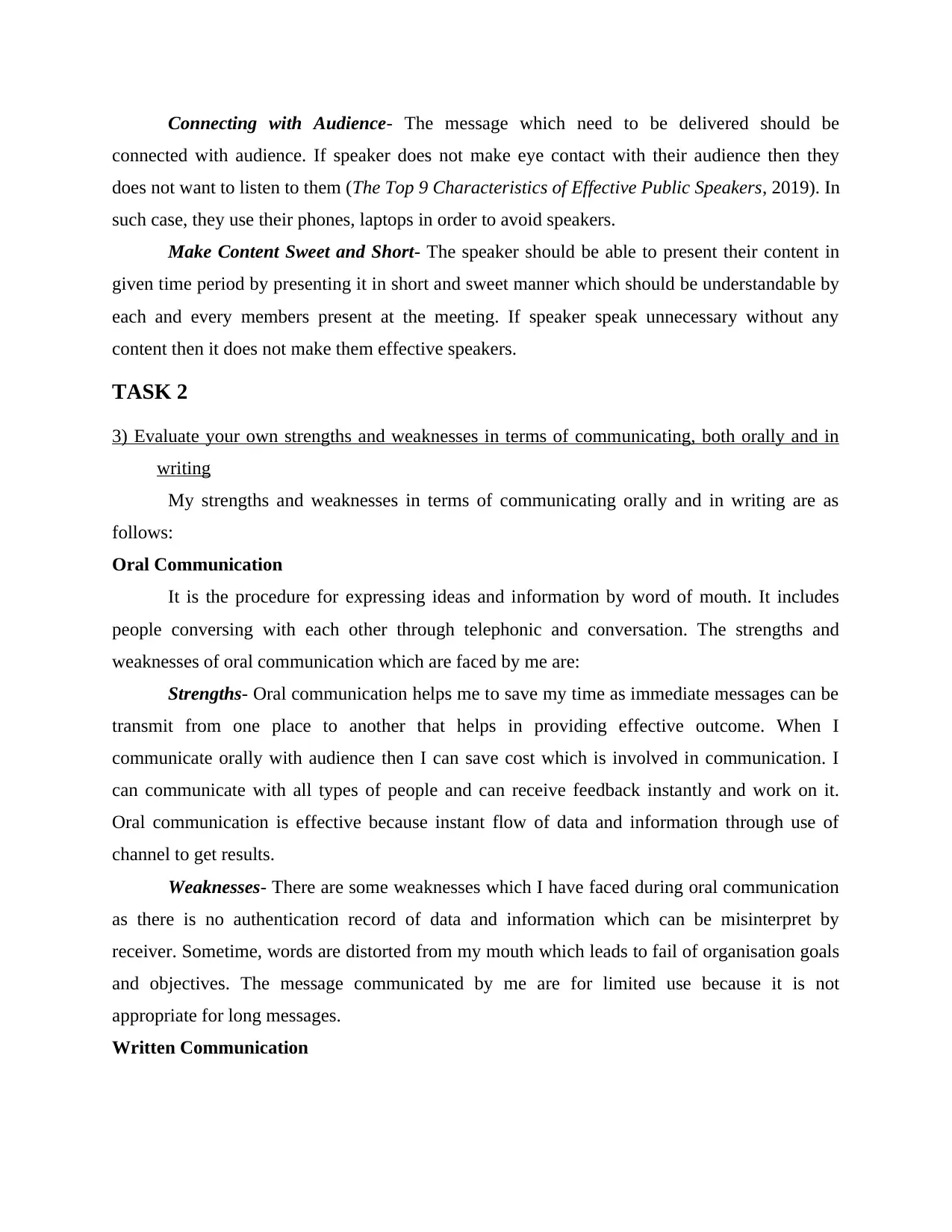
Connecting with Audience- The message which need to be delivered should be
connected with audience. If speaker does not make eye contact with their audience then they
does not want to listen to them (The Top 9 Characteristics of Effective Public Speakers, 2019). In
such case, they use their phones, laptops in order to avoid speakers.
Make Content Sweet and Short- The speaker should be able to present their content in
given time period by presenting it in short and sweet manner which should be understandable by
each and every members present at the meeting. If speaker speak unnecessary without any
content then it does not make them effective speakers.
TASK 2
3) Evaluate your own strengths and weaknesses in terms of communicating, both orally and in
writing
My strengths and weaknesses in terms of communicating orally and in writing are as
follows:
Oral Communication
It is the procedure for expressing ideas and information by word of mouth. It includes
people conversing with each other through telephonic and conversation. The strengths and
weaknesses of oral communication which are faced by me are:
Strengths- Oral communication helps me to save my time as immediate messages can be
transmit from one place to another that helps in providing effective outcome. When I
communicate orally with audience then I can save cost which is involved in communication. I
can communicate with all types of people and can receive feedback instantly and work on it.
Oral communication is effective because instant flow of data and information through use of
channel to get results.
Weaknesses- There are some weaknesses which I have faced during oral communication
as there is no authentication record of data and information which can be misinterpret by
receiver. Sometime, words are distorted from my mouth which leads to fail of organisation goals
and objectives. The message communicated by me are for limited use because it is not
appropriate for long messages.
Written Communication
connected with audience. If speaker does not make eye contact with their audience then they
does not want to listen to them (The Top 9 Characteristics of Effective Public Speakers, 2019). In
such case, they use their phones, laptops in order to avoid speakers.
Make Content Sweet and Short- The speaker should be able to present their content in
given time period by presenting it in short and sweet manner which should be understandable by
each and every members present at the meeting. If speaker speak unnecessary without any
content then it does not make them effective speakers.
TASK 2
3) Evaluate your own strengths and weaknesses in terms of communicating, both orally and in
writing
My strengths and weaknesses in terms of communicating orally and in writing are as
follows:
Oral Communication
It is the procedure for expressing ideas and information by word of mouth. It includes
people conversing with each other through telephonic and conversation. The strengths and
weaknesses of oral communication which are faced by me are:
Strengths- Oral communication helps me to save my time as immediate messages can be
transmit from one place to another that helps in providing effective outcome. When I
communicate orally with audience then I can save cost which is involved in communication. I
can communicate with all types of people and can receive feedback instantly and work on it.
Oral communication is effective because instant flow of data and information through use of
channel to get results.
Weaknesses- There are some weaknesses which I have faced during oral communication
as there is no authentication record of data and information which can be misinterpret by
receiver. Sometime, words are distorted from my mouth which leads to fail of organisation goals
and objectives. The message communicated by me are for limited use because it is not
appropriate for long messages.
Written Communication
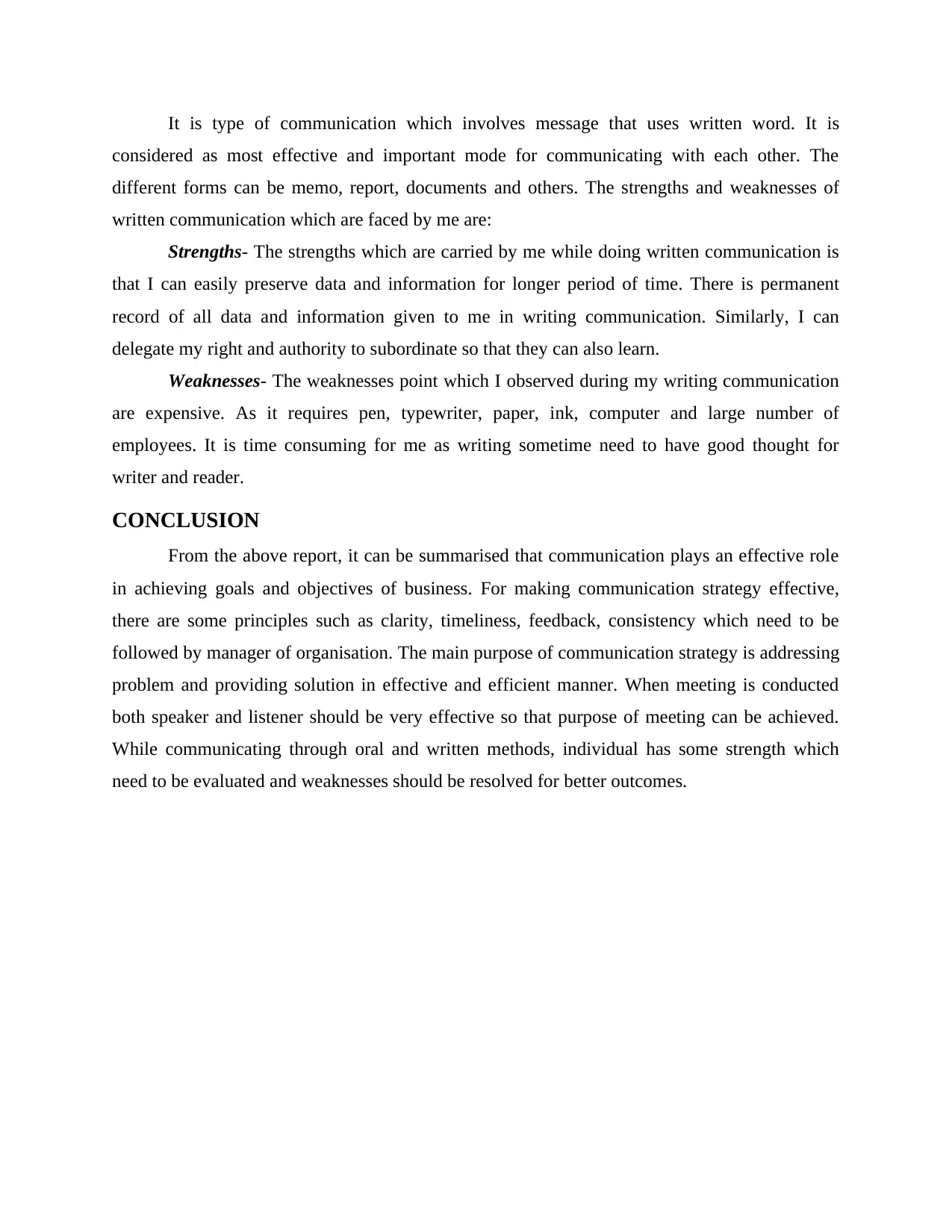
It is type of communication which involves message that uses written word. It is
considered as most effective and important mode for communicating with each other. The
different forms can be memo, report, documents and others. The strengths and weaknesses of
written communication which are faced by me are:
Strengths- The strengths which are carried by me while doing written communication is
that I can easily preserve data and information for longer period of time. There is permanent
record of all data and information given to me in writing communication. Similarly, I can
delegate my right and authority to subordinate so that they can also learn.
Weaknesses- The weaknesses point which I observed during my writing communication
are expensive. As it requires pen, typewriter, paper, ink, computer and large number of
employees. It is time consuming for me as writing sometime need to have good thought for
writer and reader.
CONCLUSION
From the above report, it can be summarised that communication plays an effective role
in achieving goals and objectives of business. For making communication strategy effective,
there are some principles such as clarity, timeliness, feedback, consistency which need to be
followed by manager of organisation. The main purpose of communication strategy is addressing
problem and providing solution in effective and efficient manner. When meeting is conducted
both speaker and listener should be very effective so that purpose of meeting can be achieved.
While communicating through oral and written methods, individual has some strength which
need to be evaluated and weaknesses should be resolved for better outcomes.
considered as most effective and important mode for communicating with each other. The
different forms can be memo, report, documents and others. The strengths and weaknesses of
written communication which are faced by me are:
Strengths- The strengths which are carried by me while doing written communication is
that I can easily preserve data and information for longer period of time. There is permanent
record of all data and information given to me in writing communication. Similarly, I can
delegate my right and authority to subordinate so that they can also learn.
Weaknesses- The weaknesses point which I observed during my writing communication
are expensive. As it requires pen, typewriter, paper, ink, computer and large number of
employees. It is time consuming for me as writing sometime need to have good thought for
writer and reader.
CONCLUSION
From the above report, it can be summarised that communication plays an effective role
in achieving goals and objectives of business. For making communication strategy effective,
there are some principles such as clarity, timeliness, feedback, consistency which need to be
followed by manager of organisation. The main purpose of communication strategy is addressing
problem and providing solution in effective and efficient manner. When meeting is conducted
both speaker and listener should be very effective so that purpose of meeting can be achieved.
While communicating through oral and written methods, individual has some strength which
need to be evaluated and weaknesses should be resolved for better outcomes.
Paraphrase This Document
Need a fresh take? Get an instant paraphrase of this document with our AI Paraphraser

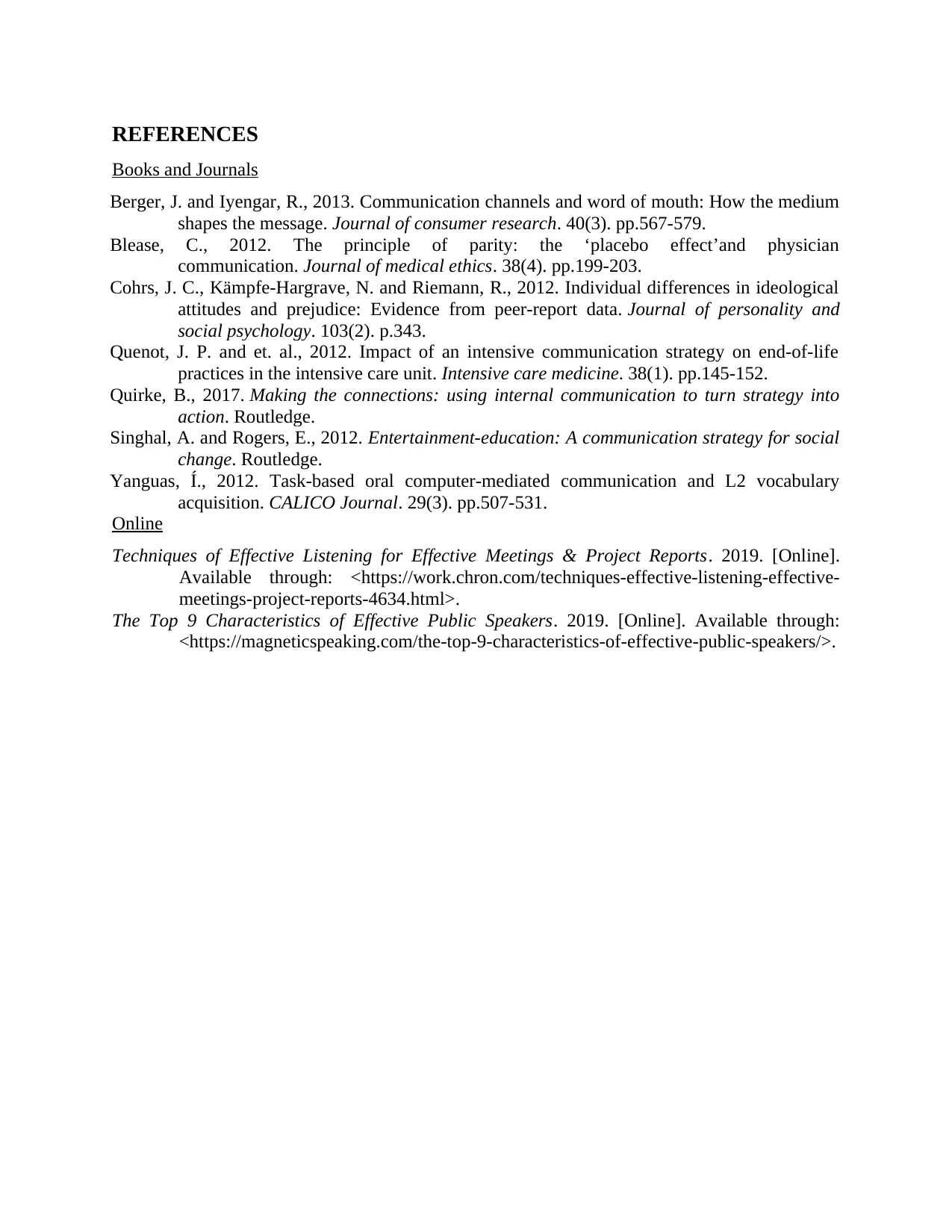
REFERENCES
Books and Journals
Berger, J. and Iyengar, R., 2013. Communication channels and word of mouth: How the medium
shapes the message. Journal of consumer research. 40(3). pp.567-579.
Blease, C., 2012. The principle of parity: the ‘placebo effect’and physician
communication. Journal of medical ethics. 38(4). pp.199-203.
Cohrs, J. C., Kämpfe-Hargrave, N. and Riemann, R., 2012. Individual differences in ideological
attitudes and prejudice: Evidence from peer-report data. Journal of personality and
social psychology. 103(2). p.343.
Quenot, J. P. and et. al., 2012. Impact of an intensive communication strategy on end-of-life
practices in the intensive care unit. Intensive care medicine. 38(1). pp.145-152.
Quirke, B., 2017. Making the connections: using internal communication to turn strategy into
action. Routledge.
Singhal, A. and Rogers, E., 2012. Entertainment-education: A communication strategy for social
change. Routledge.
Yanguas, Í., 2012. Task-based oral computer-mediated communication and L2 vocabulary
acquisition. CALICO Journal. 29(3). pp.507-531.
Online
Techniques of Effective Listening for Effective Meetings & Project Reports. 2019. [Online].
Available through: <https://work.chron.com/techniques-effective-listening-effective-
meetings-project-reports-4634.html>.
The Top 9 Characteristics of Effective Public Speakers. 2019. [Online]. Available through:
<https://magneticspeaking.com/the-top-9-characteristics-of-effective-public-speakers/>.
Books and Journals
Berger, J. and Iyengar, R., 2013. Communication channels and word of mouth: How the medium
shapes the message. Journal of consumer research. 40(3). pp.567-579.
Blease, C., 2012. The principle of parity: the ‘placebo effect’and physician
communication. Journal of medical ethics. 38(4). pp.199-203.
Cohrs, J. C., Kämpfe-Hargrave, N. and Riemann, R., 2012. Individual differences in ideological
attitudes and prejudice: Evidence from peer-report data. Journal of personality and
social psychology. 103(2). p.343.
Quenot, J. P. and et. al., 2012. Impact of an intensive communication strategy on end-of-life
practices in the intensive care unit. Intensive care medicine. 38(1). pp.145-152.
Quirke, B., 2017. Making the connections: using internal communication to turn strategy into
action. Routledge.
Singhal, A. and Rogers, E., 2012. Entertainment-education: A communication strategy for social
change. Routledge.
Yanguas, Í., 2012. Task-based oral computer-mediated communication and L2 vocabulary
acquisition. CALICO Journal. 29(3). pp.507-531.
Online
Techniques of Effective Listening for Effective Meetings & Project Reports. 2019. [Online].
Available through: <https://work.chron.com/techniques-effective-listening-effective-
meetings-project-reports-4634.html>.
The Top 9 Characteristics of Effective Public Speakers. 2019. [Online]. Available through:
<https://magneticspeaking.com/the-top-9-characteristics-of-effective-public-speakers/>.
1 out of 9
Related Documents
Your All-in-One AI-Powered Toolkit for Academic Success.
+13062052269
info@desklib.com
Available 24*7 on WhatsApp / Email
![[object Object]](/_next/static/media/star-bottom.7253800d.svg)
Unlock your academic potential
© 2024 | Zucol Services PVT LTD | All rights reserved.





